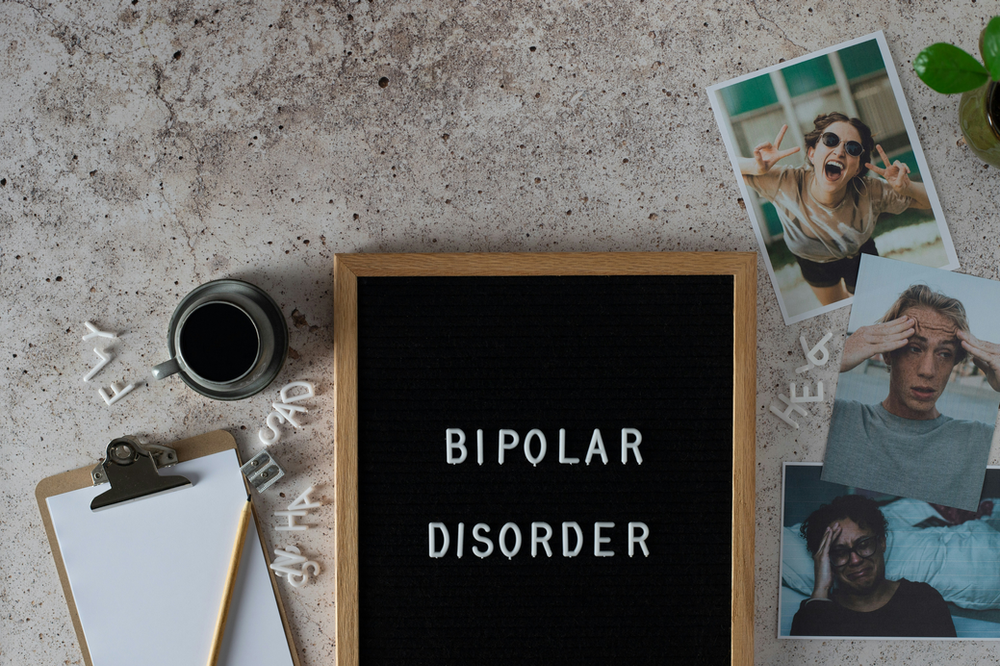Bipolar disorder, formerly known as manic-depressive illness, is a mental health condition characterized by extreme mood swings that include emotional highs (mania or hypomania) and lows (depression). Bipolar disorder affects millions of people worldwide, regardless of age, gender, or socioeconomic status, and can have a profound impact on an individual’s quality of life and overall well-being.
Living with bipolar disorder can be challenging, as it can cause disruption in relationships, interfere with work, or school, and increase the risk of substance abuse, self-harm, or suicidal thoughts. However, with the right treatment and support, many individuals with bipolar disorder can lead fulfilling and productive lives.
In this guide, we will provide practical tips and strategies for managing bipolar symptoms, coping with mood swings, and living well with bipolar disorder. Whether you are personally affected by bipolar disorder or seeking to support a loved one, this guide aims to provide valuable information and resources to help you navigate the challenges of living with bipolar disorder.
How Does Bipolar Disorder Look in Individuals?
Bipolar disorder manifests differently in individuals, but it typically involves distinct periods of intense mood swings that can vary in duration and severity. Here’s a closer look at what bipolar disorder may look like in individuals:
Manic Episodes
During manic episodes, individuals may experience an intense and elevated mood that is out of proportion to the situation. They may feel euphoric, invincible, or excessively energetic, often with a decreased need for sleep. Their thoughts may race, and they may have difficulty focusing or concentrating on tasks. Manic episodes can also involve impulsivity, reckless behavior, and poor judgment, such as engaging in risky sexual behavior, overspending, or substance abuse. While some individuals may experience extreme highs during manic episodes, others may experience hypomania, which is a less severe form of mania characterized by similar symptoms but with less impairment in functioning.
Depressive Episodes
Depressive episodes in bipolar disorder are characterized by intense feelings of sadness, hopelessness, and despair. Individuals may lose interest or pleasure in activities they once enjoyed and may experience changes in appetite, sleep patterns, and energy levels. Depressive episodes can also involve feelings of guilt, worthlessness, or suicidal thoughts. Unlike unipolar depression, depressive episodes in bipolar disorder alternate with periods of mania or hypomania, leading to distinct mood swings.
Mixed Episodes
In some cases, individuals with bipolar disorder may experience mixed episodes, which involve symptoms of both mania and depression occurring simultaneously or in rapid succession. During mixed episodes, individuals may feel agitated, irritable, or restless, while also experiencing symptoms of depression such as sadness, guilt, or hopelessness. Mixed episodes can be particularly challenging to manage and may increase the risk of impulsive or self-destructive behavior.
Cyclothymic Disorder
Cyclothymic disorder is a milder form of bipolar disorder characterized by recurrent periods of hypomanic symptoms and depressive symptoms that do not meet the criteria for a full manic or depressive episode. Individuals with cyclothymic disorder may experience frequent fluctuations in mood, but the intensity and duration of their mood swings are less severe than those seen in bipolar I or bipolar II disorder.
Overall, bipolar disorder is a complex and multifaceted condition that can manifest in various ways, depending on the individual and the specific subtype of the disorder. It is essential to recognize the signs and symptoms of bipolar disorder early and seek professional help for accurate diagnosis and appropriate treatment. With proper management and support, individuals with bipolar disorder can lead fulfilling and productive lives.
What’s the Difference Between Bipolar I and Bipolar II Disorder?
While this article primarily focuses on Bipolar I disorder, it’s important to provide information on Bipolar II disorder as well, which is characterized by recurring episodes of depression and hypomania (a less severe form of mania than seen in Bipolar I).
According to the National Institute of Mental Health (NIMH), approximately 2.8% of adults in the United States have been diagnosed with bipolar disorder, with Bipolar I being slightly less prevalent than Bipolar II. These statistics underscore the significance of understanding and addressing both types of bipolar disorder.
Bipolar I and bipolar II are both mood disorders that involve distinct patterns of emotional highs and lows. While they share similarities, they also have important differences in terms of symptom severity and presentation.
Bipolar I disorder involves manic episodes that last at least 7 days or are severe enough to require hospitalization, often accompanied by depressive episodes.
Bipolar II disorder involves hypomanic episodes (less severe than manic episodes) lasting at least 4 days and depressive episodes. While both involve mood swings between highs and lows, the intensity and duration of manic episodes differentiate the two disorders, with bipolar II characterized by less severe manic episodes or hypomania.
Hypomania in bipolar II disorder is marked by a noticeable increase in energy, activity, and mood. People experiencing hypomanic episodes may feel euphoric, highly productive, and full of ideas. They might engage in impulsive behaviors, have racing thoughts, and require less sleep without feeling tired.
The Holistic Approach: How to Personally Manage Mood Swings
Managing mood swings in bipolar disorder requires a holistic approach that addresses physical, emotional, and lifestyle factors. Here’s a comprehensive guide to managing mood swings holistically:
Therapy: Engage in psychotherapy, such as cognitive-behavioral therapy (CBT), dialectical behavior therapy (DBT), or mindfulness-based therapy, to learn coping skills, identify triggers, and manage stress. Therapy can help you develop strategies for recognizing and responding to mood swings effectively.
Mindfulness and Meditation: Incorporate mindfulness and meditation practices into your daily routine to promote emotional balance and reduce stress. Mindfulness techniques, such as deep breathing, body scanning, and mindfulness meditation, can help you cultivate present-moment awareness and regulate your emotions.
As supported by this article published by Mindful Health Solutions: “Studies suggest that meditation can even help stabilize mood swings over the long term.”
Healthy Lifestyle Habits: Adopt healthy lifestyle habits that support emotional well-being, including getting regular exercise, eating a balanced diet rich in fruits, vegetables, and whole grains, practicing good sleep hygiene, avoiding alcohol and recreational drugs, and reducing stress through relaxation techniques such as yoga or tai chi.
Routine and Structure: Establish a daily routine and stick to a regular schedule to help regulate mood and reduce the likelihood of mood swings. This includes waking up and going to bed at the same time each day, eating meals at regular intervals, and scheduling activities and responsibilities consistently.
Self-awareness and Monitoring: Pay attention to your mood patterns and early warning signs of mood swings, such as changes in sleep, appetite, energy levels, or irritability. Keep a mood journal or use a mood tracking app to monitor your symptoms over time and identify triggers or patterns that may contribute to mood swings.
Social Support: Seek support from friends, family members, or support groups who understand and empathize with your experience. Talking to others who have experience with bipolar disorder can provide validation, encouragement, and practical advice for coping with mood swings.
Alternative Therapies: Explore alternative therapies and holistic modalities that may complement traditional treatment approaches, such as acupuncture, massage therapy, herbal supplements, or aromatherapy. Consult with a healthcare provider or holistic practitioner to determine which therapies may be safe and beneficial for you.
Here are some local alternative therapies located in St. Petersburg, Fl:
The Best Acupuncturists in St. Petersburg
Top 10 Best Massage Therapies in St. Petersburg
Top 10 Best Aromatherapies in St. Petersburg
Emergency Plan: Develop a crisis plan or safety plan in collaboration with your healthcare providers and loved ones. This plan should outline steps to take in case of a severe mood episode, including who to contact for support, where to go for help, and how to access emergency services if needed.
Self-care and Stress Management: Prioritize self-care activities that promote relaxation, self-nurturance, and stress reduction. This may include engaging in hobbies or activities you enjoy, spending time in nature, practicing gratitude, setting boundaries with others, and seeking out opportunities for self-expression and creativity.
Read our past blog: The Health Benefits of Self-Care
Medication Management: Bipolar mood swings often require the assistance of medication prescribed by a professional to help stabilize mood fluctuations and manage symptoms effectively. Medications such as mood stabilizers, antipsychotics, and antidepressants may be recommended by a psychiatrist to address the underlying neurochemical imbalances associated with bipolar disorder. While medication is not always the sole treatment approach, it can be an essential component of a comprehensive treatment plan in managing bipolar mood swings.
By incorporating these holistic strategies into your daily life, you can empower yourself to manage mood swings effectively and cultivate emotional balance and well-being.
Remember that managing bipolar disorder is an ongoing process, and it’s essential to be patient with yourself, practice self-compassion, and seek professional help and support when needed. With dedication, self-awareness, and a holistic approach to care, you can navigate the challenges of bipolar disorder and live a fulfilling and meaningful life.
How to Support a Loved One with Bipolar Mood Swings
Supporting a loved one who experiences bipolar mood swings can be challenging, but there are several holistic approaches that can help provide comfort, stability, and understanding. Here are some holistic strategies for helping a loved one with bipolar mood swings:
Educate Yourself: Take the time to educate yourself about bipolar disorder, including its symptoms, triggers, and treatment options. Understanding the condition can help you better support your loved one and respond to their needs with empathy and compassion.
Open Communication: Foster open and honest communication with your loved one about their experiences with bipolar disorder. Encourage them to share their thoughts, feelings, and concerns with you, and actively listen without judgment. Validate their experiences and offer reassurance and support.
Create a Supportive Environment: Create a supportive and nurturing environment for your loved one that promotes emotional well-being and stability. Encourage healthy lifestyle habits, such as regular exercise, balanced nutrition, and sufficient sleep, and help them establish a daily routine that promotes stability and routine.
Encourage Self-care Practices: Encourage your loved one to prioritize self-care practices that promote relaxation, stress reduction, and emotional balance. This may include engaging in activities they enjoy, spending time in nature, practicing mindfulness or meditation, and seeking out social support from friends, family, or support groups.
Be Patient and Understanding: Be patient and understanding with your loved one as they navigate the ups and downs of bipolar mood swings. Recognize that mood swings are a symptom of their condition and may not always be within their control. Offer support and encouragement without pressuring them to “snap out of it” or “get over it.”
Help Them Develop Coping Strategies: Assist your loved one in developing coping strategies and skills to manage their mood swings effectively. This may include teaching them relaxation techniques, stress management strategies, and mindfulness practices that can help them regulate their emotions and cope with triggers.
Offer Practical Assistance: Offer practical assistance to help alleviate stress and lighten their load during periods of mood swings. This may involve helping with household tasks, running errands, or providing transportation to appointments. By offering practical support, you can help reduce their stress and promote a sense of stability.
Encourage Treatment Adherence: Encourage your loved one to adhere to their treatment plan and attend therapy appointments regularly. Offer to accompany them to appointments or provide reminders to take their medications as prescribed. Encourage them to communicate openly with their healthcare provider about their symptoms and treatment needs.
Set Boundaries: While it’s essential to offer support and understanding, it’s also important to set boundaries to protect your own well-being. Establish clear boundaries around what you can and cannot provide in terms of support and be honest about your own needs and limitations.
Seek Support for Yourself: Finally, remember to prioritize your own self-care and seek support for yourself as you support your loved one with bipolar mood swings. Joining a support group for caregivers or seeking therapy for yourself can provide validation, guidance, and a sense of community as you navigate the challenges of supporting a loved one with bipolar disorder.
By implementing these holistic approaches, you can help create a supportive and nurturing environment for your loved one with bipolar mood swings and provide them with the understanding, empathy, and practical support they need to manage their condition effectively.
Holistic Treatment at Be Your Best Self & Thrive Therapy
At Be Your Best Self & Thrive, we understand the complex challenges of managing bipolar mood swings and are committed to providing compassionate and effective support for individuals struggling with this condition. Through our holistic therapy approach, we offer a range of therapeutic modalities aimed at promoting emotional well-being, self-awareness, and self-care.
Rochelle Young, one of our clinicians, is currently accepting new clients and specializes in person-centered therapy. With a focus on empathy and unconditional positive regard, Rochelle works collaboratively with individuals to explore their thoughts, feelings, and experiences in a safe and supportive environment. She can help individuals struggling with bipolar mood swings navigate relationship issues, cope with grief triggers, and develop effective coping strategies for managing mood swings.
If you are interested in scheduling a free 15-minute consultation with Rochelle Young, Get Started Now!
Additionally, Nicole Malene, who will be accepting new clients in Fall 2024, brings a unique perspective to her therapy practice, drawing from mindfulness-based stress reduction techniques and eastern philosophies. Nicole can help individuals with bipolar mood swings cultivate mindfulness, self-awareness, and acceptance, empowering them to develop a deeper understanding of their emotions and navigate mood swings with greater resilience.
As the owner of BYBS, Jamie Molnar emphasizes the importance of holistic approaches in managing bipolar mood swings. While currently on a waitlist, Jamie believes in the transformative power of mindfulness, meditation, and self-care practices in enhancing the quality of individuals’ lives and alleviating mood swing experiences.
At BYBS, we strive to integrate holistic modalities into our therapy sessions to support individuals in managing bipolar mood swings holistically.
Through our compassionate and holistic approach to therapy, we are dedicated to supporting individuals struggling with bipolar mood swings in achieving greater emotional balance, self-awareness, and well-being. Together, we can work towards managing mood swings effectively and fostering a greater sense of empowerment and resilience in navigating life’s challenges.
One Last Word from the BYBS Content Creator
Navigating bipolar mood swings can be an intricate journey, but at Be Your Best Self & Thrive (BYBS), we believe in the power of holistic therapy to provide compassionate support and effective tools for managing this condition. Through modalities such as person-centered therapy, mindfulness-based stress reduction, and self-care practices, we aim to empower individuals to cultivate greater self-awareness, resilience, and emotional balance.
Together, we can navigate the complexities of bipolar disorder with compassion, understanding, and hope.
Let’s do our best & thrive,
Alayna Dorfman






